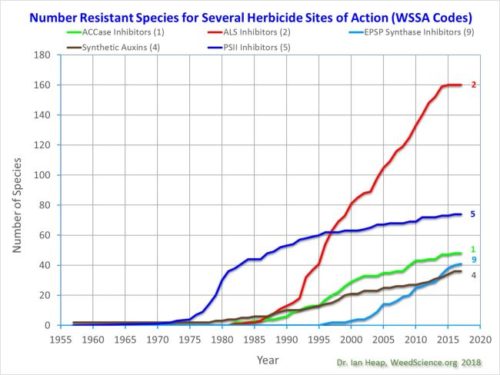Is Dicamba finally on its way out? A first step, at least.
A press release from The Center for Food Safety announces that the agribusiness giant Corteva is dropping its “Plant-Killing Pesticide Dicamba Amid Legal Battles, Drift Concerns.”
Dicamba, like glyphosate, is a controversial herbicide widely used in conjunction with crops genetically modified to resist it. Why controversial?
- It is potentially toxic to adults, children, and pets.
- It drifts long distances and kills “non-target” crops that are not genetically modified—those that are organically grown, for example.
National Pesticide Information Network Fact Sheet on Dicamba has a Q and A.
What are some signs and symptoms from a brief exposure to dicamba?
Pure dicamba is low in toxicity if breathed. If inhaled, people may experience dizziness, and irritation of the nose, resulting in coughing. If you get pure dicamba on your skin, it is low in toxicity, however skin irritation may develop. If you get dicamba in your eyes, it is moderately toxic. If dicamba is swallowed, people have reported symptoms such as vomiting, loss of appetite and muscle spasms. If a large amount is swallowed, diarrhea and abdominal pain have been reported.
Pets may be exposed to dicamba if they come into contact with plants that have been treated with dicamba, either by eating the plants or walking through an area where dicamba was applied. Signs that a dog or a cat may have been exposed to dicamba include shortness of breath, muscle spasms and the animal may produce a lot of saliva. Birds may also be exposed to dicamba by eating dicamba granules and signs include wing drop, a loss of controlled movements, and weakness.
The Missouri Department of Agriculture also has a Fact Sheet. It reviews damages caused by this herbicide and complaints about it.
Dicamba is a highly volatile chemical that can damage non-target plant species through spray drift and/or volatilization (vapor drift). Misuse of dicamba products may cause serious damage to non-dicamba-tolerant soybeans, sensitive crops, non-crop plants, and endangered species.
The Center for Food Safety press release explains some history:
In June 2020, a federal appeals court prohibited the spraying of dicamba on GE crops, in response to a lawsuit brought by farming and environmental groups led by Center for Food Safety (CFS). The Court ruled that EPA had failed to estimate the “enormous and unprecedented damage” caused by dicamba drift, which triggered strife that “has torn apart the social fabric of many farming communities.” Just a few months later, Trump’s EPA re-approved the dicamba products, made by Bayer and BASF. CFS and allies are back in court challenging this unlawful decision. Press reports suggest Biden’s EPA will allow continued use for at least a year, permitting a fifth year of devastating dicamba drift damage.
In another landmark lawsuit against Monsanto (now owned by Bayer) and BASF, Missouri farmer Bill Bader was awarded $75 million for dicamba drift damage that devastated his peach orchard.
As Bill Freese, the Center’s director, points out, “If even an agrichemical giant like Corteva is dropping dicamba to avoid liability from the enormous, widely-documented drift damage it causes, what will it take for the Biden Administration to end the use of these hazardous products on America’s croplands for good?”


